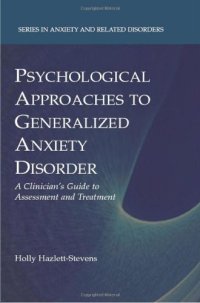
Ebook: Psychological Approaches to Generalized Anxiety Disorder: A Clinician's Guide to Assessment and Treatment
Author: Holly Hazlett-Stevens (auth.)
- Tags: Clinical Psychology, Health Psychology, Psychotherapy and Counseling
- Series: Series in Anxiety and Related Disorders
- Year: 2008
- Publisher: Springer US
- Edition: 1
- Language: English
- pdf
One of the hallmarks of generalized anxiety disorder, along with diffuse pathological worry and somatic complaints, is its resistance to therapy. Of available treatment modalities for GAD, cognitive-behavioral therapy garners the best empirical support in terms of successful long-term results. Psychological Approaches to Generalized Anxiety Disorder offers clinicians a wide variety of CBT strategies to help clients develop core anxiety-reduction skills, presented so that readers can hone their own clinical skills. Concise without skimping on information, this book reviews current theory and research, addresses important diagnostic issues, and provides salient details in these key areas:
- Assessment procedures and treatment planning.
- Latest therapy outcome data, including findings on newer therapies.
- Specific CBT techniques, including cognitive strategies, psychoeducation, anxiety monitoring, relaxation exercises, and more.
- Dealing with noncompliance, client ambivalence, and other challenges to therapy.
- Special considerations for treating older adults with GAD.
- Relapse prevention, transition issues, and ending treatment.
Psychological Approaches to Generalized Anxiety Disorder has much information of interest to new and seasoned clinicians, clinical researchers, and academic psychologists. It is also an especially valuable reference for graduate students treating or studying the anxiety spectrum.
Concise, yet without skimping on information, this book reviews current theory and research, addresses important diagnostic issues, and provides salient details in a number of key areas related to GAD. Assessment procedures and treatment planning are covered, along with the latest therapy outcome data, including findings on newer therapies. Also detailed are specific cognitive behavioral therapy techniques, including cognitive strategies, psychoeducation, and anxiety monitoring.